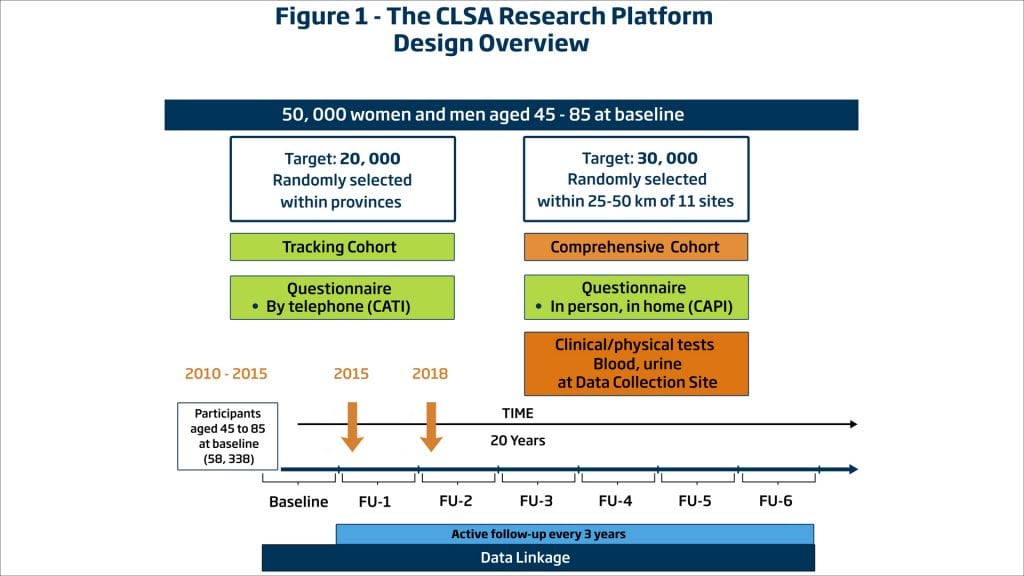
The three principal investigators on the Canadian Longitudinal Study on Aging, Drs Raina, Wolfson and Kirkland, discuss their approach to the design of Canada’s landmark study on ageing.
In Canada, as in the majority of EU countries, low birth rates and high life expectancy are drastically changing the population structure. In 2016, for the first time, the number of Canadians aged 65 and older was larger than the number of children under age 15.1 Reports of these demographic shifts towards an older population are often accompanied by the portrayal of ageing as a challenge for the individual and for society and a tendency to look at ageing as a set of physical symptoms, organ by organ, illness by illness, along with a tally of the personal, social and financial burdens imposed on families and public systems and services. Ageing has been presented as simply an issue of decline and loss, and it was this that the Canadian Longitudinal Study on Aging set out to examine.
This negative perception of what it means to be in one’s 70s, 80s, and 90s has not changed despite advances in medicine that have and will continue to allow us to optimise these added years. The potential contribution of older adults and seniors as engaged and productive members of society will not be realised if a change in the perception of ageing as inevitably negative does not occur. Re-envisioning ageing as a process of continuous development over the life course, where both growth and decline can co-occur and adaptations can mitigate some of the losses, will allow societies to capitalise on the positive aspects of ageing and to invest in policies and programmes that promote not only living long but also living well. The challenge, though, is how do we transition to a more positive view of ageing?
An essential step is to create a platform to collect information in real time that can provide an evidence base for action. Collecting longitudinal data with the goal of advancing science and informing policymaking to support healthy ageing is essential, and these data can be used to avert the problem of acting upon myths, common beliefs, or anecdotal information about ageing. The Canadian Longitudinal Study on Aging (CLSA) was conceived with the vision to generate new knowledge in order to better understand why some people age healthily while others do not. The CLSA is a strategic initiative of the Canadian Institutes of Health Research (CIHR) with operational funding from the CIHR and a national infrastructure funded by the Canada Foundation for Innovation.
The changing face of ageing research
Along with changing the perception of ageing and the impact of an ageing population, there are also new opportunities to study the dynamics of ageing from an interdisciplinary perspective. Recent advances in biosciences (e.g. genetics, epigenetics, and metabolomics), informatics, data science analytics, and population health research are changing the face of research, presenting new and exciting possibilities for scientific discovery. To maximise the potential of these emerging sciences and to convert it into groundbreaking research and knowledge, the CLSA bridges and integrates the biosciences with the social, psychological, population and public health sciences. As a research platform, the CLSA provides opportunities to study biological and ‘omics’ data, in conjunction with physical, lifestyle, economic, environmental and psychosocial factors in the same individuals over time. The depth and breadth of data available along with a large sample size and repeated measurements over time provide increased statistical power to address complex interrelationships and a multitude of outcomes.
The CLSA platform is designed to support the collection, preparation, and release of data and biospecimens, building capacity for high-quality research on ageing in Canada and internationally. It enables researchers to respond nimbly to a wide variety of research questions that inform policy and practice, without the need for expensive and time-consuming de novo primary data collection.
A state-of the-art platform for the study of ageing
The CLSA is a national, longitudinal research platform that has recruited participants from all ten Canadian provinces and is collecting data on wide-ranging areas along with biological samples that will support numerous ageing-related research questions. The cohort of 51,338 participants, aged 45-85 at enrolment, is composed of two complementary cohorts that may be studied separately or together:
- The Tracking cohort of 21,241 participants randomly selected from within all ten provinces who are interviewed by telephone; and
- The Comprehensive cohort of 30,097 participants randomly selected from within 25-50km of 11 data collection sites (in seven provinces) who are interviewed in-person, take part in in-depth physical assessments at data collection sites, and provide blood and urine samples.

A common core of questionnaire information is collected for both the Tracking and Comprehensive cohorts, and the same core data and data collection is planned for future follow-ups with both cohorts. All participants will have a follow-up interview every three years and will be followed for 20 years or until death. Recruitment and baseline data collection were completed in 2015, and the first follow-up was completed in mid-2018. Fig. 1 shows an overview of the CLSA architecture.
Canada has a long and successful history of research in ageing. Following on from the successes of the Canadian Study of Health and Aging,2 the CLSA engaged researchers from across Canada in its development and implementation. Over 160 co-investigators, including theme leads and site leads, contributed to the initial design and content of the CLSA and continue to provide ongoing support. The CLSA research questions, measures and methods were developed with the support and input of expert working groups.
The study’s aim is to better understand the contributions of biological, chronic diseases, disability, functional performance, physical health, health and social care services, lifestyle and behaviour, cognition, psychological, economic, environment and social measures in adult development and ageing.3 The CLSA data collection tools are described on the CLSA website (https://www.clsa-elcv.ca) with links to standard operating procedures and additional documentation. As a state-of-the-art data collection platform, the CLSA data collection uses electronic data capture.
Using the CLSA platform to generate new knowledge
A fundamental principle of the CLSA is to make data and biospecimens available to the research community while protecting the privacy and confidentiality of study participants. Since 2016, more than 124 research teams have accessed the data, an additional 60 research teams have been engaged in conducting methodological projects using the CLSA platform, and more than 15 research papers have been published using CLSA data to date. The CLSA puts a priority on availability of the data for trainees and has implemented a policy of providing the raw data free of charge either to those completing graduate theses or for use as the basis of postdoctoral research. Currently, more than one in three applications for data access come from trainees. A formal data access process is in place to review applications for data and sample access.
The projects range from those that are narrowly focused on a specific aspect of ageing (e.g. lung function) to those that are more comprehensive in scope (e.g. health and social inequity).
With the upcoming release of chemistry biomarkers, genome-wide association studies, epigenetic and metabolomics data, we anticipate a rapid increase in the use of the CLSA data for addressing interdisciplinary research questions that integrate multiple aspects of the ageing process.
References
- Statistics Canada. An aging population. https://www150.statcan.gc.ca/n1/pub/11-402-x/2010000/chap/pop/pop02-eng.htm
- Canadian study of health and aging: study methods and prevalence of dementia CMAJ. 1994 Mar 15;150(6):899-9
- Raina PS, Wolfson C, Kirkland SA, et al. The Canadian Longitudinal Study on Aging (CLSA). Can J Aging Rev Can Vieil. 2009;28(Special Issue 03):221–229. doi:10.1017/S0714980809990055
Co-authors
Parminder Raina, PhD
Professor, Department of Health Research Methods, Evidence, and Impact
Lead PI, Canadian Longitudinal Study on Aging
Faculty of Health Sciences
McMaster University
+1 905 525 9140 ext. 22197
Christina Wolfson, PhD
Professor of Medicine and of Epidemiology, Biostatistics & Occupational Health
McGill University Research Integrity Officer
Co-PI, Canadian Longitudinal Study on Aging
Director – Statistical Analysis Centre, Canadian Longitudinal Study on Aging
+1 514 934 1934 ext. 44739
Susan Kirkland, PhD
Professor
Interim Head and Chief
Dept of Community Health & Epidemiology/NSHA
Co-PI, Canadian Longitudinal Study on Aging
Dalhousie University
+1 902 494 1235


Canadian Longitudinal Study on Aging
https://www.clsa-elcv.ca/
http://www.cihr-irsc.gc.ca/e/51054.html
This is a commercial article that will appear in Health Europa Quarterly issue 6, which will be published in August, 2018.









